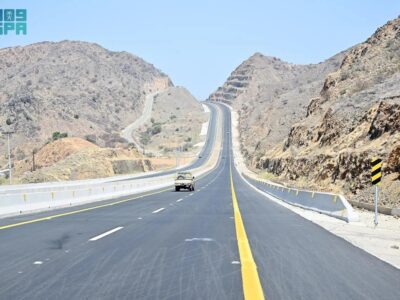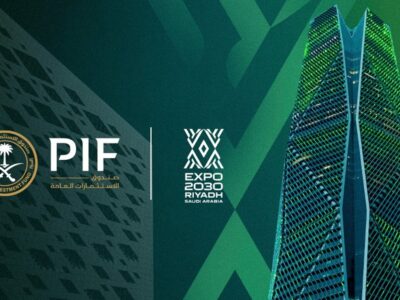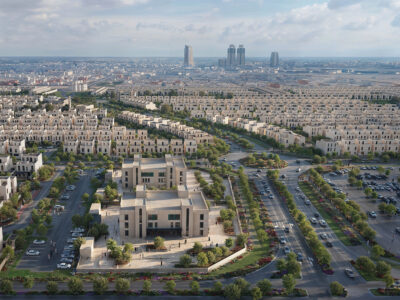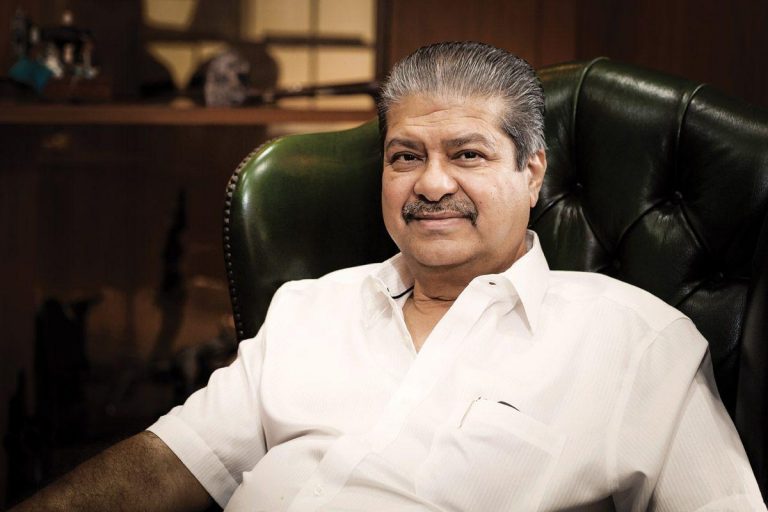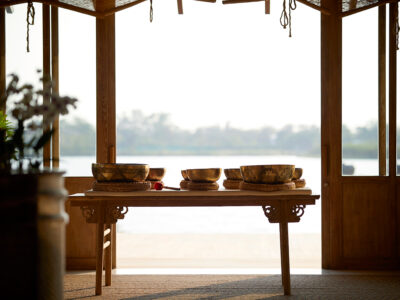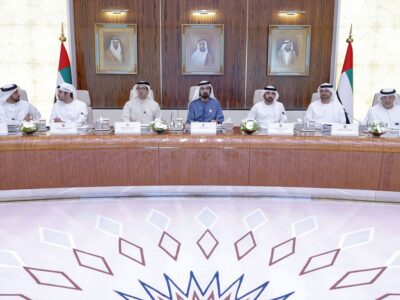Manohar Lahori has the no-nonsense attitude of someone who has lived in Dubai for a long time, seen a multitude of changes — some good, some bad — carried on regardless and reaped the rewards in return.
His company, the Palmon Group, was established in Mumbai in 1974 as a clothing manufacturer but moved its operations to Dubai in 1985. It was one of the first businesses to be registered in the Jebel Ali Free Zone (Jafza), the cluster of logistics firms on the road to Abu Dhabi.
Now group chairman, Lahori was offered the opportunity to set up in Dubai during a stopover to London in the 1980s when he happened to meet Dubai Ports (DP) World chairman Sultan Ahmed Bin Sulayem, who was working to attract foreign businesses to the then-nascent free zone.
“I was the first business on the free zone and the first expat to buy property here, in the Murjan Tower [in Dubai Marina] in 1999, and, a few years later, I bought two villas on the Palm Jumeirah the day it opened to buyers. Everything, Dubai experiments on me,” he says in an interview with Arabian Business.
It might have been an experiment at the time, but Jafza today has about 7,000 registered companies and accounts for at least one-fifth of Dubai’s economy, and still recorded 17 percent growth in the number of businesses moving in between 2014 and 2015.
Thirty years later, Lahori is still working there and he does not regret the move in the slightest. His company has come a long way from its humble beginnings — having expanded into fashion, interior design, real estate, logistics and food — but it is still focused on Dubai.
“Ninety percent of our group is in Dubai and 75 percent of that operates in Jebel Ali. I have great confidence in Dubai,” he says. “We’ve had a lot of problems in the last 30 years, from the Gulf War to recessions and so on, but Dubai has always come out of it and continued to grow.”
One of the recent advancements he has seen is the move towards cushioning the economy by introducing taxes, or, as a first step, removing subsidies. The UAE scrapped fuel subsidies in the summer and is in talks with other GCC countries to introduce a value added tax (VAT), and Lahori concedes the cost of living is rising in Dubai.
“I feel [the government] is going to do much more like this. But the advantages Dubai gives us far outweigh this. Some people are spoilt here — how can the government continue to spend so much money [providing services] and yet not charge anything?
“See this infrastructure they have? It’s world class. So what is it to ask people to pay a little bit? The government is not talking about killing us by putting on huge taxes; it is talking about a penny here, a penny there.”
Lahori says Jafza businesses recently received a letter from the authorities declaring that there would be no taxes in Jebel Ali for the next 50 years. “I don’t believe they will ever introduce income tax, and it would take time to introduce a VAT because they need every [GCC] country on board.”
He not only has confidence in Dubai, he has confidence in his children — who are rapidly taking over the reins of the family business for the next chapter of its growth story. On arrival at Palmon Group’s head office at Jafza, Arabian Business was surprised to learn it would not be interviewing just Lahori as planned, but his son and daughter, as well.
This is because Lahori’s main focus today is on expanding Palmon’s industrial real estate division, which plans to build 1 million sq ft of warehousing and logistics space over the next five years. Meanwhile, his daughter Meher Anand is managing director of Palmon Group and CEO of Meher & Riddhima, the group’s fashion design business, and also works closely with her cousin Chirag Lahori on the group’s fit out and interiors business, which represents luxury Italian kitchen brands such as Ernestomeda and Valcucine.
The chairman’s son Kunal Lahori is executive director at Palmon Group and CEO of Pret To Go, the flagship brand of the group’s fast-growing food and beverage division.
Palmon Group recorded 30 percent growth across all divisions last year, Lahori says, but it is from these three sectors (real estate, fashion and F&B) that it expects to see the biggest growth over the next two-three years — and from F&B in particular.
Casual dining venture Pret To Go was launched November 2014 and already has five locations, in Dubai International Financial Centre (DIFC), Dubai Media City, Jafza, Downtown Jebel Ali and Dubai Airport Free Zone Authority (Dafza), and will open at Abu Dhabi Airport next year. There are also plans to expand Pret To Go to other GCC locations, for example, the company is in talks with authorities to open at Muscat Airport and the new Kuwait Airport terminal in 2017/18.
“What we’re seeing is that there are a lot of households where both people are working and don’t want to cook, so restaurants are going to do better and better,” Kunal says. “But it depends — new restaurants are opening every day so you have to have a niche. You also have to have good chefs and good quality food.”
He believes Dubai lacks a strong midmarket F&B offer, so he is developing a new dining concept that — pending a deal to be signed with a free zone authority in the coming weeks — should open in Dubai in the first quarter of 2016.
Arabian Business is not permitted to report on the plans until the agreement is in place, but Kunal says it is “a US-grown concept that has never before been done in Dubai”, based on the need for a “large scale multi-cuisine offer”.
“We think this is the future of the F&B sector in Dubai, because there are so many high-end restaurants that offer particular types of food, that choice at a reasonable price is limited.”
Meanwhile, Palmon Group is pressing ahead with plans to grow its industrial real estate development business, a reasonably young sector in Dubai. The company is building industrial warehouses and logistics centres on behalf of multinationals operating in Dubai, and has completed one project in Jafza and has two others under construction, at Dubai Technopark and the new Dubai World Central (DWC) logistics zone near Al Maktoum airport.
These three schemes amount to 1 million sq ft of development in total, and the group plans to build another 1 million sq ft of warehouses over the next five years.
“What we are doing in industrial real estate is very niche — this is a product few are offering in Dubai,” says Lahori. “It is very complementary to our business because our roots were in manufacturing and logistics and we know what we are doing.”
Part of Palmon Group’s original expertise was in reprocessing and re-labelling clothes originally intended for Europe or elsewhere, for the Arabic market.
Lahori says logistics is, and will continue to be, a key plank of Dubai’s future economic growth — reflected in the investment the emirate is making in huge new industrial zones such as DWC.
“Logistics is very important for Dubai. DWC will become the second logistics hub after Jafza, and the country is building a new airport, a new port, a new four-lane logistics corridor from Jebel Ali Port to DWC so container trucks can go straight there without using the main roads. Dubai Technopark, too, is going up very fast — the sector is doing extremely well.”
Lahori also claims that Al Quoz, Dubai’s first industrial and manufacturing hub located off Sheikh Zayed Road, will likely be demolished in future to make way for more lucrative commercial and residential schemes. “The whole thing is going to go soon,” he says. “It’s a prime real estate location [close to the Dubai Mall and Burj Khalifa] — why would they keep it for industrial?”
He says the group is “always looking” for opportunities to invest in other types of commercial property, such as retail and offices, but it has “very strict criteria”. Kunal interjects to list the group’s requirements: “We need to have a minimum lease term of five years; minimum yield of 8-10 percent; the covenant needs to be strong, the tenant should be a reputable multinational or publicly listed company as this is a long-term, low risk investment, it’s not an impulse buy.”
Lahori adds: “This is why we do not own much residential property. The market is very saturated and any average Joe can go and pick up an apartment or villa, get high capital appreciation and flip it on. As we are looking for long-term investments, we don’t really mind getting a very small capital appreciation as long as we are getting a stable return each year from a tenant that isn’t going to get up and go if there is a small recession.”
The family does invest a substantial chunk of its money in residential property but these are personal investments kept outside the Palmon Group. There are 20 properties, Lahori says, mainly one- to two-bed apartments in and around Dubai Marina. “Again, we have set criteria for these investments: we are looking for 5 percent rental yields; marina view; mid-floor so you can still see the water and the life, and just one or two bedrooms.”
“I believe there is continued demand in the Dubai rental market but the price per square foot must be right,” Lahori adds. “Private investors with a certain amount of net worth want the penthouse with four bedrooms etcetera. That’s not right for us — we want the investment properties that appeal to a wider market. I have been in the real estate business for a very long time.”
Luxury fashion brand Meher & Riddhima has ambitious expansion plans for the next 12-24 months and is another area of anticipated growth for Palmon Group. The company supplies its clothing to 20 stores across North America, Russia and the Middle East and intends to add a further 50 partnerships by next season and open a flagship store in Dubai by mid-2016.
Meher says she has identified several possible locations: “We are looking for a luxury location but one that is fairly prominent for our first standalone store. It would be nice to have a presence in Dubai Mall but if the exact spot is not right and it would get lost, this would not be good.”
She says currency fluctuations, in particular the collapse of the Russian ruble, has had a noticeable impact on luxury consumers — “Yes, I have heard they are much more particular about what they buy” — but that this has not impacted her business so far.
“I am focusing on the US market at present and they are the ones that are still buying. I guess the population is such that it accommodates more people at the top end. Plus, I find that if [the product] is a good style, good quality and the price point is right, people will buy it,” Meher says.
“The feedback I get from buyers is that our gowns look $4,000 but are actually $1,000. They love the quality, they love the design and they are okay with the price. So in a price-conscious market, as long as you give customers value for money, you will do well.”
Meher also is revamping her website so she can start selling online. “Times are changing, people are busy, I want to give them that option, too.”
The Palmon Group is a private company and refuses to divulge financial specifics. However, in general terms, Lahori says he is extremely optimistic, telling Arabian Business he forecasts 100 percent growth over the next 12 months. His children immediately step in and moderate this to 50 percent, “because people will say we are too optimistic”. But his intentions are clear.
Much of the anticipated growth would come as a result of a planned merger of Palmon Group’s security business Secure Plus with a large international facilities management company. This company, which Lahori declines to name until the deal has been completed, operates in 20 countries worldwide, has 11,000 staff, specialises in facilities management but wants to expand its security management division, which is outsourced at present.
Secure Plus has more than 400 security and cleaning staff. Under the deal, the partner company would take its security services back in-house and the merged operation would grow to around 3,000 guards over the next five years. Palmon Group is hoping to sell a majority stake to the company and the deal is expected to be completed in December.
Lahori says he would not rule out a sale or initial public offering (IPO) of part or parts of the group in the coming years: “In a few years the kids may grow tired and say, enough, let’s float this bit and let other people run it.”
But there are no plans as yet, he insists, as the family is by no means “tired” of it all yet. “Kunal has a passion for food, Meher has a passion for clothes and I’ve got a passion for real estate. That’s why it’s all been great.”
